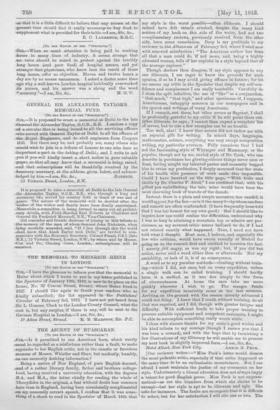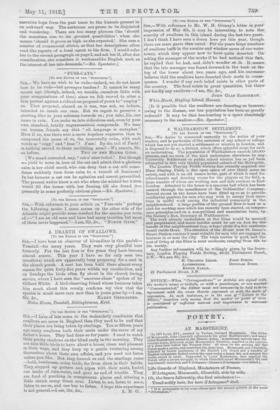THE ASCENT OF HUISCARAN.
[To THE EDITOR OF THE ""SPECTATOR.""] it permitted to one American born, which surely Amust be regarded as a misfortune rather than a fault, to make /rejoinder to her English critic, not in the caustic or ferocious taanner of Messrs. Whistler and Shaw, but modestly, humbly, ..ne one earnestly desiring information. P Being a native of New England, of pure English descent, natd.of a rather literary family, father and brothers college- bred, having received a university education, with the degrees B.A. and M.A., the latter chiefly for reading the whole of Thucydidee in the original, a feat without doubt less common lore than in England, having been occasionally complimented ,sou my unusually correct , speech, I confess that it was some- thing of a shock to read in the Spectator of March 16th that my style is the worst possible—often illiterate. I should indeed have felt utterly crushed, despite the many kind notices of my book on this side of the water, had not two complimentary reviews, previously received from the other side, been some consolation. Deep is my gratitude to my reviewer in the Athena um of February 3rd, where I read now with renewed satisfaction : "The American author has done all that a man could do, if not more, and, being a highly educated woman, tells of her exploits in a style beyond that of the average explorer."
Though doctors thus disagree, if my style appears to any one illiterate, I am eager to know the grounds for such opinion, if so be I may avoid giving offence in future; for let
me assure my critic in.the Spectator that despite my self-con- fidence and complacence I am really teachable. Carefully do
I shun the split infinitive, the use of "like" as a conjunction, " that much," "that high," and other specimens of, I suppose, Americanese, unhappily common in our newspapers and in the speech and writings of many Americans,
If I commit, not these, but other errors as flagrant, I shall be profoundly grateful to my critic if he will point them out. Often illiterate, he says ; I cannot then expect a complete list of errors, but to cite a few examples can be no trouble.
Too well, alas! I know that nature did not endow me with an especial gift for writing. In school days, languages, mathematics, science, everything was easy except composition
writing, my particular aversion. Fully conscious that I had not the fascinating style of Whymp.er and Mummery, or the popular, though not by me, envied style of Dr. Cook, who can
describe in perchance too glowing colours things never seen or done, having sought my talented pastor and earnestly begged him to revise my production, I deeply mourned that the state of his health with pressure of work made this impossible. Could I have inserted on the title page, " With frills and thrills by Dr. Charles F. Aked," I am confident that, with 'his gifted pen embellishing the tale, 'mine would have been the most charming book of travels of the decade.
Instead, there is a plain and simple narrative, too candid, it would appear, for the few—oris it the many P—by whom candour and conceit are often confounded. (nave frequently been told that I was too honest for my own good.) But I should like to inquire how one could realize the difficulties, understand why I was so long in attaining a mountain top or admire my per- sistence, as my severest critic seems inclined to do, if I had not related exactly what happened. True, I need not have
told what I thought. Most men, I believe, and especially the
few who criticise, would have sworn roundly at Rudolf for going on to the summit first and omitted to mention the fact.
I merely felt angry, as was my right; but, if you did but notice, never said a word either then or afterwards. But my .amiability, or lack of it, is of no consequence.
A word as to my peculiar methods—climbing without train- ing—which I did, not once, but on every expedition, unless a .single walk can be called training. I should hardly
term it a method, as it was due simply to - the force of circumstances. At home the cars take me more
quickly wherever I wish to go. The meagre -funds for my expedition invariably came at the last moment. Arriving on the ground with the season already advanced I could not delay. I knew that I could, without training, do all that was required, and I did, though with greater fatigue and difficulty. With sufficient funds to take proper training to procure suitable equipment and competent assistants, I might be able to accomplish something really worth while.
I close with sincere thanks for my critic's good wishes and his kind tribute to my courage (though I assure you that I
was born a coward), and with the hope that by furnishing a, few illustrations of my illiteracy he will enable me to present my next book in slightly improved form.—I am, Sir, &c., Hotel Albert, New York City, ANNIE S. PECK.
tOur reviewer writes :—" Miss Peek's letter would disarm the most pedantic critic, especially if that critic happened at the same time to be an enthusiastic mountaineer. But I am afraid I must maintain the justice of my comments on her style. Unfortunately a liberal education does not always imply a talent for good English prose. Miss Peck is not ungram- matical—as are the blunders from which she claims to be exempt—but her style is apt to be illiterate and ugly. She asks for instances. The faults are so organic that it is difficult to select, but for her satisfaction I will cite one or two. The narrative hops from the past tense to the historic present in an awkward way. The sentences are prone to be disjointed and wandering. There are too many phrases like should the mountain rise to its greatest possibilities' when she means should it prove as high as she expected.' She uses a number of commercial cliches, so that her descriptions often read like reports of a local agent to his firm. I would refer her to the second paragraph on page 2, and ask her if, after due consideration, she considers it workmanlike English such as the interest of her tale demands."—ED. Spectator.]











































 Previous page
Previous page